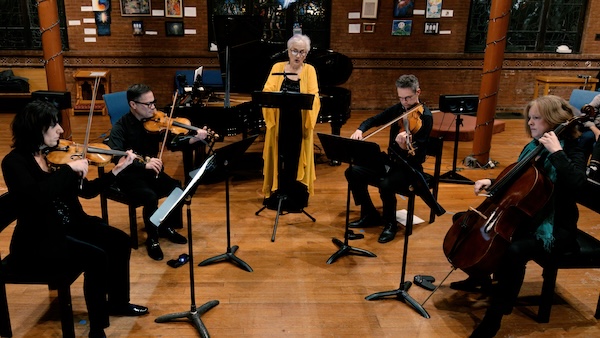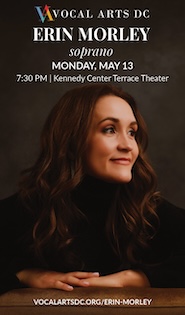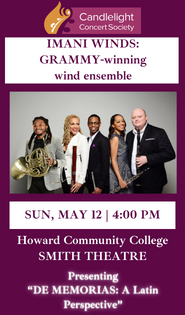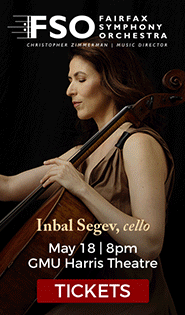Leigh sculptures inspire bracing music with 21st Century Consort

Soprano Lucy Shelton performed Jon Deak’s The Jury with the 21st Century Consort Saturday night at St, Mark’s. Photo: H. Paul Moon.
The 21st Century Consort, which will mark its 50th anniversary next season, became the resident ensemble for contemporary music at the Hirshhorn Museum and Sculpture Garden in 1978. The ensemble drew inspiration for its latest program, presented at St. Mark’s on Capitol Hill Saturday evening, from the work of Simone Leigh. The African-American sculptor, who represented the U.S. at the 2022 Venice Biennale, is currently the focus of a solo exhibit at the museum.
Leigh, who was born in Chicago to Jamaican parents, mixes elements of her West Indian, African, and American heritage in her sculpture. The Consort centered this tribute program mostly on composers who were women, of Caribbean descent, or both. The evening opened with Voodoo Dolls, a work of driving rhythm by African-American composer Jessie Montgomery. Violinists Marissa Regni and Regino Madrid, violist Daniel Foster, and cellist Rachel Young, all members of the National Symphony Orchestra, began the work by tapping West African drumming patterns on the bodies of their instruments. The rest of the piece unfolded with active rhythms and folk music inflections, such as fiddle-style glissandi and hints of the pentatonic scale, before fading away on a slow repeat.
The quartet played with similar unity and panache in Glances / I Don’t Belong Here, a set of seven brief movements by British composer Hannah Kendall (no relation to 21st Century Consort artistic director Christopher Kendall). Each miniature captured a different mood, from meditative to agitated, inspired by a British-Guyanese photographer’s portraits of black people in rural Britain. Bristling dissonance implied the tension of cultural differences.
Jamaican composer Mikhail Johnson, born in 1989, was present for the performance of three of his pieces. Seated at the church’s organ, he performed his brief fantasy Si Di Staar Deh!, composed last year, to open the concert’s second half. An intense minute in duration, the work used fragments of the nursery tune “Twinkle, Twinkle, Little Star,” mostly unrecognizable, combined with hints of Messiaen-like harmonic structures. NSO clarinetist Paul Cigan gave an energetic account of the more rambling solo Pasa Pasa, a fusion of bouncy melodic cells evoking an all-night dance party in Kingston.
The most substantial work by Johnson came first, Praise to the Mother of Jamaican Art, a tense setting of the poem of the same name by Jamaican poet laureate Lorna Goodison. Pianist Lisa Emenheiser wove an atmospheric backdrop with the gentle accompaniment part, while soprano Lucy Shelton sang of “the first nameless woman” who made art to console herself for the loss of her children “sold away from her.” It’s an austere, powerful piece, and the septuagenarian Shelton’s musical intensity held attention, in spite of a heavy vibrato.
NSO flutist Matthew Ross joined Emenheiser, Cigan, Regni, and Young for Cuban-born composer Tania León Parajota Delaté (For J. from T.), a tribute to fellow composer Joan Tower. The piece progressed with an easy-going stride, marked out by a walking bass line in the cello, but it was overshadowed by CryptOlogiE, a piece for the same combination (flute, clarinet, violin, cello, and piano) by Shawn Okpebholo, an American composer with Nigerian roots.
Going a step beyond composers who have alluded to names with melodic motifs, like BACH or DSCH, Okpebholo based his themes on a pitch series derived from family birthdays and, most memorably, a Morse code sequence referencing his daughter’s name. Emenheiser often tapped out this rhythm on a hand-damped string in the piano, assisted at first by her cellist colleague and later by her page-turner. Remarkably, all of that artifice added up to a pleasing piece that percolated with restless energy.
Two brief works contrasted the tastes of avant-garde art and popular entertainment. Jazz singer Jeanne Lee made her recording of Angel Chile in 1974, an unaccompanied improvisation based on the name of her daughter, Naima. While this was played, Shelton improvised a less convincing response, in dialogue with the recording, drawing on the name of Simone Leigh’s daughter, Zenobia. Emenheiser played Eleanor Alberga’s Jamaican Medley, a compilation of Jamaican folk songs made for Jamaica’s Independence Day, with the gilded virtuosity of a Lisztian paraphrase.
The string quartet that had opened the evening returned for the final work, Jon Deak’s song The Jury. Rhina P. Espaillat’s moving poem, about four birds assessing the value of the human race, was heard first in a recording. At various times during the performance Shelton and the musicians mimicked the sound of cold wind blowing through the “bare tree” where the birds converse. Deak explained in his composer’s note that the four instruments voice the bird quartet as well: the first violin as the judgmental eagle, the second as the sympathetic sparrow, the viola the whimsical pigeon, and the cello the hungry vulture.
Shelton narrated the scene with a mixture of singing and speaking, seeming to translate the scratchings and musings of the four instruments. After the vulture’s bluesy encomium to humans, whose endless wars “nourished me with their young,” the four string players turned even more garrulous, their parts violently overlapping. At the end, they stood and recited together the poem’s final couplet, an odd, menacing conclusion that obliquely alluded to the troubling undercurrents of Leigh’s sculpture, about the human impact of African colonization.
The 21st Century Consort returns to the Hirshhorn’s Ring Auditorium to celebrate the museum’s 50th anniversary 5 p.m. April 6. 21consort.org




